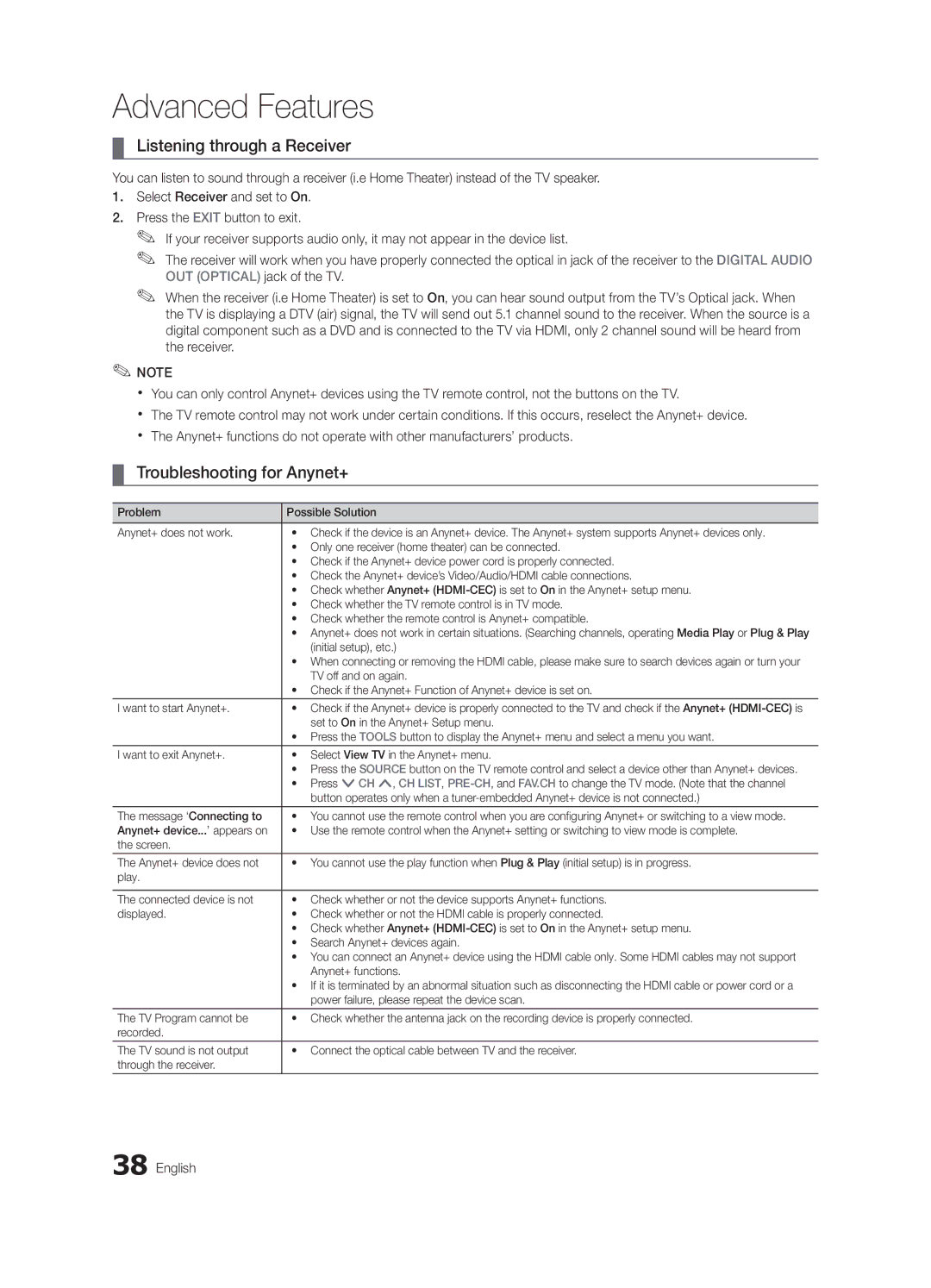
Advanced Features
¦¦ Listening through a Receiver
You can listen to sound through a receiver (i.e Home Theater) instead of the TV speaker.
1.Select Receiver and set to On.
2.Press the EXIT button to exit.
✎✎ If your receiver supports audio only, it may not appear in the device list.
✎✎ The receiver will work when you have properly connected the optical in jack of the receiver to the DIGITAL AUDIO OUT (OPTICAL) jack of the TV.
✎✎ When the receiver (i.e Home Theater) is set to On, you can hear sound output from the TV’s Optical jack. When the TV is displaying a DTV (air) signal, the TV will send out 5.1 channel sound to the receiver. When the source is a digital component such as a DVD and is connected to the TV via HDMI, only 2 channel sound will be heard from the receiver.
✎✎NOTE
xx You can only control Anynet+ devices using the TV remote control, not the buttons on the TV.
xx The TV remote control may not work under certain conditions. If this occurs, reselect the Anynet+ device. xx The Anynet+ functions do not operate with other manufacturers’ products.
¦¦ Troubleshooting for Anynet+
Problem | Possible Solution |
|
|
Anynet+ does not work. | • Check if the device is an Anynet+ device. The Anynet+ system supports Anynet+ devices only. |
| • Only one receiver (home theater) can be connected. |
| • Check if the Anynet+ device power cord is properly connected. |
| • Check the Anynet+ device’s Video/Audio/HDMI cable connections. |
| • Check whether Anynet+ |
| • Check whether the TV remote control is in TV mode. |
| • Check whether the remote control is Anynet+ compatible. |
| • Anynet+ does not work in certain situations. (Searching channels, operating Media Play or Plug & Play |
| (initial setup), etc.) |
| • When connecting or removing the HDMI cable, please make sure to search devices again or turn your |
| TV off and on again. |
| • Check if the Anynet+ Function of Anynet+ device is set on. |
|
|
I want to start Anynet+. | • Check if the Anynet+ device is properly connected to the TV and check if the Anynet+ |
| set to On in the Anynet+ Setup menu. |
| • Press the TOOLS button to display the Anynet+ menu and select a menu you want. |
|
|
I want to exit Anynet+. | • Select View TV in the Anynet+ menu. |
| • Press the SOURCE button on the TV remote control and select a device other than Anynet+ devices. |
| • Press > CH <, CH LIST, |
| button operates only when a |
The message ‘Connecting to | • You cannot use the remote control when you are configuring Anynet+ or switching to a view mode. |
Anynet+ device...’ appears on | • Use the remote control when the Anynet+ setting or switching to view mode is complete. |
the screen. |
|
|
|
The Anynet+ device does not | • You cannot use the play function when Plug & Play (initial setup) is in progress. |
play. |
|
|
|
The connected device is not | • Check whether or not the device supports Anynet+ functions. |
displayed. | • Check whether or not the HDMI cable is properly connected. |
| • Check whether Anynet+ |
| • Search Anynet+ devices again. |
| • You can connect an Anynet+ device using the HDMI cable only. Some HDMI cables may not support |
| Anynet+ functions. |
| • If it is terminated by an abnormal situation such as disconnecting the HDMI cable or power cord or a |
| power failure, please repeat the device scan. |
The TV Program cannot be | • Check whether the antenna jack on the recording device is properly connected. |
recorded. |
|
|
|
The TV sound is not output | • Connect the optical cable between TV and the receiver. |
through the receiver. |
|
38 English
